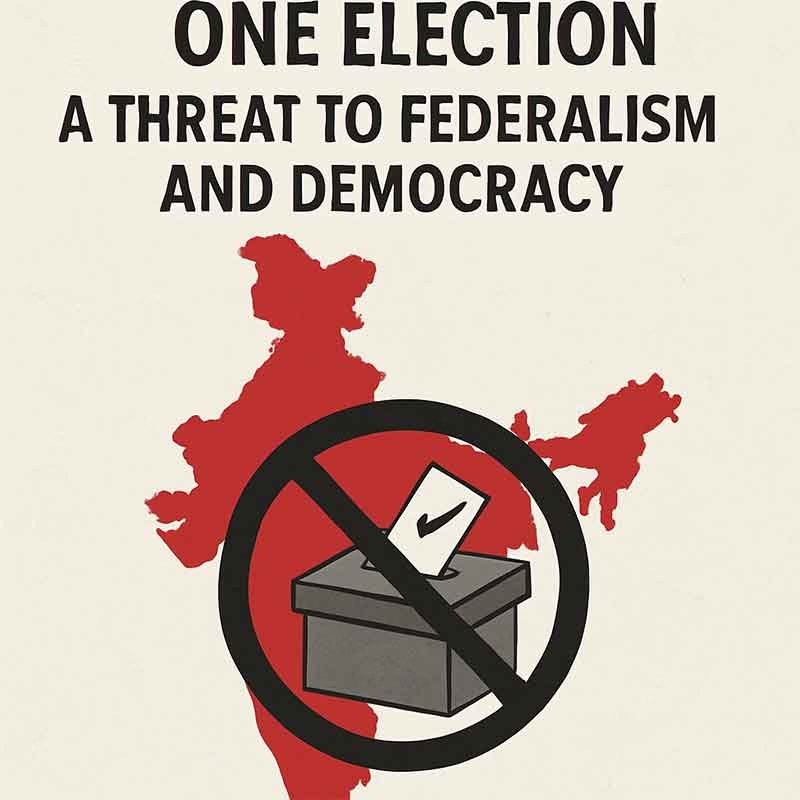In recent times, the proposal of “One Nation, One Election” has sparked intense debate across the country. The central government, led by Prime Minister Narendra Modi in its third consecutive term, has brought forward this idea claiming that it will reduce the cost of conducting elections amidst challenges such as threats from neighboring countries and global economic instability. Some argue that this system would not only reduce expenses but also improve administrative efficiency. However, several political parties and democratic analysts have strongly opposed this proposal.
In this context, the Modi cabinet recently approved the recommendations of a committee led by former President Ram Nath Kovind, which was set up to examine the feasibility of the proposal. The committee recommended conducting elections for the Parliament, state legislative assemblies, and local bodies simultaneously. However, this approach contradicts the federal spirit enshrined in the Indian Constitution. It undermines democratic values and threatens the essence of federalism.
According to the Constitution, both Parliament and state assemblies have a fixed five-year term. Implementing the One Nation, One Election system would require altering these fixed terms. For instance, if a state government collapses midway through its term, the assembly’s schedule would have to be aligned with the national election cycle. This means local issues and regional needs may be suppressed under a centralized system, thereby eroding the spirit of federalism. India is a nation of diverse cultures, languages, and regional problems. This proposal could potentially erase that diversity. It poses a grave threat to India’s democracy and constitutional federal structure.
Challenges of Constitutional Amendments:
To implement this proposal, amendments must be made to five key provisions of the Constitution (e.g., Article 83, Article 172, etc.). This requires a two-thirds majority in Parliament and approval from a majority of state legislatures. The Modi government currently does not have such a majority. In this backdrop, the Prime Minister appealed during his Independence Day address for all political parties to support the proposal, indicating an effort to mobilize public opinion. However, constitutional amendments are not easy and must take into account the opinions of the states, making the process highly challenging.
Threat to Democracy:
Though “One Nation, One Election” appears to be a move toward reducing expenditure and enhancing governance, it risks weakening democratic principles. If elections are held simultaneously, national issues could overshadow local concerns, diminishing the autonomy of states and local bodies. Furthermore, it would strip states of their authority over the conduct of elections. This approach could lead to an increase in centralized political power and open the door to authoritarian tendencies.
Potential Drawbacks:
Local issues and regional interests might take a backseat. As a result, citizens would lose the opportunity to question the government on fundamental issues during elections. Centralizing the election schedule would compromise the autonomy of state governments. If a government collapses mid-term, imposing President’s Rule or adjusting the term would go against the democratic spirit. It is essential to explain these dangers to the public and raise awareness.
Challenge to Federal Principles:
India is a federal country where powers are divided between the Centre and the states. Critics argue that this proposal undermines the autonomy of states and strengthens central dominance, contradicting the federal spirit embedded in the Constitution.
Stand of Political Parties:
Currently, when elections are held at different times, smaller parties can focus their resources and campaigns more effectively. But if all elections are held simultaneously, they will be forced to divide their resources, which may affect their electoral performance. Despite this, regional parties aligned with the BJP like the Telugu Desam Party and Jana Sena have supported the idea. However, national parties like the CPM, Congress, and several other regional parties have opposed it. The CPM has described it as an attempt at authoritarian centralization.
International Experiences:
In Sweden, national, regional, and municipal elections are held on the same day, and this has worked successfully. However, Sweden is a smaller country with a uniform political system. South Africa also conducts national and regional elections simultaneously. But unlike India, it does not have a diverse state-based federal structure. India, with its vast linguistic, cultural, and political diversity, cannot directly replicate these foreign models.
Safeguard India’s diversity La
“One Nation, One Election” poses a serious challenge to India’s parliamentary democracy. It must be recognized as a dangerous step toward centralization. Political parties and the public must engage in broad discussions on this issue. The public must be made aware that the real intention behind this proposal could be to establish an authoritarian regime. Everyone must stand united to resist it. It is our collective responsibility to safeguard India’s diversity and democratic strength at this crucial moment.
P.V. Kumaraswamy Reddy is a Social and Political Analyst
Courtesy: Counter Currents

